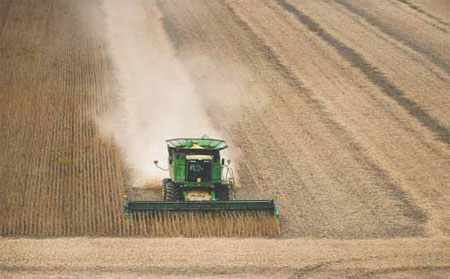Jump in US corn imports forecast
Updated: 2013-04-01 11:02
By Michael Barris in New York (China Daily)
|
||||||||
|
A combine harvests corn in Muskingum County, Ohio. China, the biggest market for American agricultural products, is forecast to have a bigger appetite for corn from the United States this year. Ty Wright / Bloomberg |
A projected increase in US exports of corn to China due to a shortage of high-quality grain could benefit both countries, bolstering their already-strong trade relationship in agriculture, experts said.
"It's a win-win situation," said Su Ye, head of market research at Minnesota's Department of Agriculture.
Zhang Qi, an analyst with Yigu Information Consulting Ltd, was quoted by Bloomberg News on Thursday as saying that China this year may need to increase corn imports to a record 7 million metric tons. That would be near the government's limit and is due to heavy snow this winter that degraded the quality of grain, making it less suitable as animal feed. Corn has become an increasingly important commodity in China as prosperous citizens eat more meat, which requires more feed for poultry and livestock.
Colin Carter, director of the University of California's Giannini Foundation of Agricultural Economics, told China Daily that a jump in corn imports from the United States would solidify trade ties with China in farm products. The relationship has improved noticeably in recent years, he said.
"The US and China enjoy a strong bilateral relationship in agricultural trade," Carter said. "China is the number one market for US agricultural exports and the third-most-important source of US agricultural imports. Great corn imports from the US will serve to heighten this relationship."
An increase in Chinese imports of US corn could lead to further agricultural exchanges between the countries. During a visit by Xi Jinping, as China's vice-president, to the US last year, Agriculture Minister Han Changfu pointed out that agriculture was one of the first areas in which modern China and the US began to cooperate. Over the past 30 years, Han said, the countries have formed a "solid foundation" for cooperation, driven by a mutual view of farming as a strategic industry.
China in 2012 was the top market for US agricultural exports, with over $23 billion worth of products bought, said Brian Mabry, a spokesman for the US Department of Agriculture. China is also forecast to be the No 1 importer for US farm goods this year, he said.
"USDA has a long-standing collaborative relationship of scientific and technological cooperation with China, dating back to 1978," Mabry said. "We are continually looking for new opportunities for cooperation that benefit both of our countries and the world."
He said that when Agriculture Secretary Tom Vilsack hosted Xi (who has since become president of China) and Han at a bilateral agricultural symposium in Iowa in February 2012, the two ministry-level officials signed the US-China Strategic Plan for Cooperation in Agriculture, which signaled the countries' intention "to collaborate in addressing the global challenges of food safety, food security and sustainable agriculture".
Veronica Nigh, an economist with the nonprofit American Farm Bureau Federation, said the US has been China's dominant corn exporter for the past three years. Increased demand would "maintain and improve prices for US farmers", she said.
Chinese imports of US corn almost doubled in 2012 from the previous year, despite a severe drought that affected much of the US.
Ye, of the Minnesota Department of Agriculture, while saying high prices for US corn would pose "an obstacle" to imports by China, pointed out that corn on US commodities markets has fallen 14 percent since a record high in August during the drought.
Although China could buy cheaper corn from other countries, Ye said, the superior quality and food-safety standards of US corn justify the higher cost.
"As many importers from other countries have found out, you get what you pay for," she said.
The University of California's Carter also sees the need to import corn as a sign that China might "move somewhat faster" in approving genetically modified corn for commercial production.
Large-scale introduction of genetically modified crops is regarded as an important step in China's efforts to feed about one-fifth of the world's population. China gave safety approvals to genetically modified rice and corn in 2009 but has not yet begun commercial production, despite spending billions of yuan on research.
michaelbarris@chinadailyusa.com

 In Photos: 7.0-magnitude quake hits Sichuan
In Photos: 7.0-magnitude quake hits Sichuan
 Li Na on Time cover, makes influential 100 list
Li Na on Time cover, makes influential 100 list
 FBI releases photos of 2 Boston bombings suspects
FBI releases photos of 2 Boston bombings suspects
 World's wackiest hairstyles
World's wackiest hairstyles
 Sandstorms strike Northwest China
Sandstorms strike Northwest China
 Never-seen photos of Madonna on display
Never-seen photos of Madonna on display
 H7N9 outbreak linked to waterfowl migration
H7N9 outbreak linked to waterfowl migration
 Dozens feared dead in Texas plant blast
Dozens feared dead in Texas plant blast
Most Viewed
Editor's Picks

|

|

|

|

|

|
Today's Top News
Live report: 7.0-magnitude quake hits Sichuan, heavy casualties feared
Boston suspect cornered on boat
Cross-talk artist helps to spread the word
'Green' awareness levels drop in Beijing
Palace Museum spruces up
First couple on Time's list of most influential
H7N9 flu transmission studied
Trading channels 'need to broaden'
US Weekly

|

|








